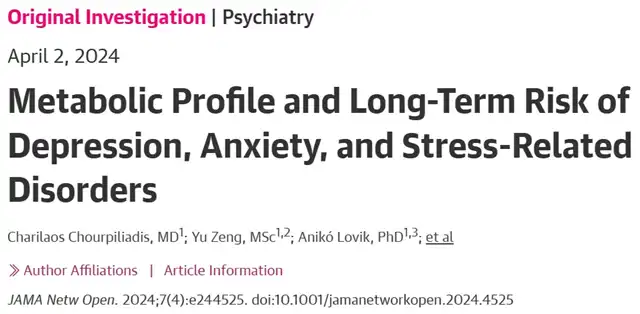High Blood Sugar and Lipids Linked to Mental Health Risks
- Normal Liver Cells Found to Promote Cancer Metastasis to the Liver
- Nearly 80% Complete Remission: Breakthrough in ADC Anti-Tumor Treatment
- Vaccination Against Common Diseases May Prevent Dementia!
- New Alzheimer’s Disease (AD) Diagnosis and Staging Criteria
- Breakthrough in Alzheimer’s Disease: New Nasal Spray Halts Cognitive Decline by Targeting Toxic Protein
- Can the Tap Water at the Paris Olympics be Drunk Directly?
High Blood Sugar and Lipids Linked to Mental Health Risks
- Should China be held legally responsible for the US’s $18 trillion COVID losses?
- CT Radiation Exposure Linked to Blood Cancer in Children and Adolescents
- FDA has mandated a top-level black box warning for all marketed CAR-T therapies
- Can people with high blood pressure eat peanuts?
- What is the difference between dopamine and dobutamine?
- How long can the patient live after heart stent surgery?
High Blood Sugar and Lipids Linked to Mental Health Risks. Study Links High Blood Sugar and Lipids to Increased Risk of Depression, Anxiety, and Stress-related Disorders.
A 21-year study has found a link between high blood sugar/lipids and an increased risk of depression, anxiety, and stress-related disorders.
An increasing body of research suggests a connection between metabolic imbalances and the development of mental disorders, with inflammation possibly acting as a mediator. Lipid and glucose abnormalities can activate innate immune cells, promoting the release of pro-inflammatory cytokines and biogenic amine breakdown metabolism, leading to hypothalamic inflammation induced by microglia cells. These inflammations are associated with the development of depression, anxiety, and stress-related disorders, all of which are common mental illnesses affecting about one-third of individuals in their lifetime.
To explore the association between blood carbohydrate, lipid, and lipoprotein biomarkers and the risk of depression, anxiety, and stress-related disorders, a team of researchers from the Karolinska Institute in Sweden conducted a longitudinal study. They followed over 210,000 people for an average of 21 years and found that high levels of glucose and triglycerides were associated with a 30% and 15% increased risk, respectively, of the three aforementioned mental disorders, while high levels of high-density lipoprotein cholesterol (HDL-C) were associated with a 12% reduced risk.
The study, published in the JAMA Network Open journal, utilized data from the Swedish AMORIS (Apolipoprotein MOrtality RISk) cohort of 211,200 participants aged 16 and above, none of whom had any mental disorders at baseline. The primary outcomes of the study were the first diagnosis of depression, anxiety, or stress-related disorders, including acute stress reaction, post-traumatic stress disorder, adjustment disorder, other reactions to severe stress, and unspecified severe stress reactions.

Among the 211,200 participants, 42.0% were female, with a mean baseline age of 42.1 years. Over the average 21.0-year follow-up period, a total of 16,256 individuals were diagnosed with depression, anxiety, or stress-related disorders, resulting in an incidence rate of 36.4/10,000 person-years, with an average age at diagnosis of 60.5 years.
Of the participants, 4.6% were diagnosed with depression (incidence rate of 21.5/10,000 person-years), 3.6% with anxiety (incidence rate of 16.6/10,000 person-years), and 2.3% with stress-related disorders (incidence rate of 10.5/10,000 person-years). 1.5% of participants were diagnosed with both depression and anxiety, less than 1% with depression and stress-related disorders (0.9%), or both anxiety and stress-related disorders (0.7%), and 0.4% were diagnosed with all three disorders.
Compared to those with low or normal levels, high levels of glucose and triglycerides were associated with a 30% and 15% increased risk, respectively, of depression, anxiety, and stress-related disorders, while high levels of HDL-C were associated with a 12% reduced risk. There was no difference in the risk of depression, anxiety, or stress-related disorders between participants with low and normal glucose levels. Similar results were observed when analyzing depression, anxiety, and stress-related disorders separately. There were no gender differences in these associations.
A sensitivity analysis including only employed individuals showed results similar to the main analysis.
In terms of temporal trends, individuals with depression, anxiety, or stress-related disorders had consistently higher levels of glucose, triglycerides, and total cholesterol in the 20 years before diagnosis, as well as higher levels of ApoA-I and ApoB in the 10 years before diagnosis. Similar results were observed in depression, but not in anxiety or stress-related disorders.
Overall, in this large population-based longitudinal cohort study, researchers found that elevated levels of glucose and triglycerides and reduced levels of HDL-C were associated with an increased risk of common mental disorders (depression, anxiety, or stress-related disorders). This association was consistent across the three individual disorders and did not vary by gender.
Previous studies have explored the association between biomarkers and mental disorders, but, to the researchers’ knowledge, no longitudinal study has investigated the association between lipoproteins and anxiety and stress-related disorders. In this study, no association with lipoproteins was found within the analysis timeframe, but in the trend analysis, individuals with mental disorders, especially depression, showed elevated levels of ApoA-I and ApoB in the 10 years before diagnosis. These pre-symptomatic stages of the diseases may explain the observed temporal trends.
The researchers suggest closer follow-up of patients with metabolic imbalances to prevent and diagnose mental disorders early. Further research is needed to confirm whether strict or early interventions for cardiovascular metabolic diseases can offset the increased risk.
High Blood Sugar and Lipids Linked to Mental Health Risks. Study Links High Blood Sugar and Lipids to Increased Risk of Depression, Anxiety, and Stress-related Disorders.
(source:internet, reference only)
Disclaimer of medicaltrend.org
Important Note: The information provided is for informational purposes only and should not be considered as medical advice.



